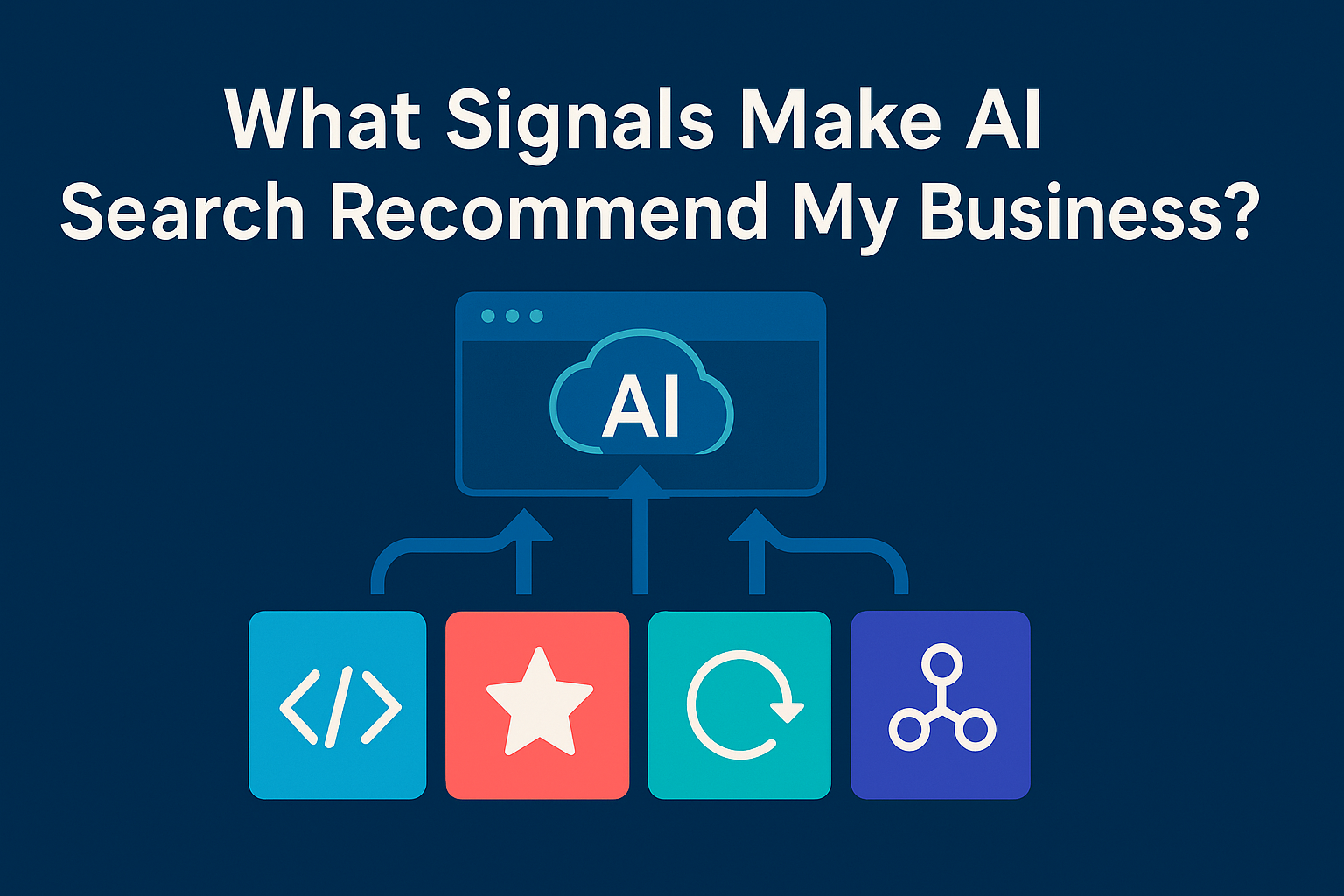What Signals Make AI Search Engines More Likely to Recommend My Product or Service?
AI Search • Nov 13, 2025 12:25:20 PM • Written by: Kelly Kranz

AI search engines favor sources with consistent structured data, authentic review signals, regular content updates, and clear product entity definitions. These technical signals help LLMs understand, trust, and cite your business as an authoritative source.
Frequently Asked Questions
What technical signals do AI search engines use to recommend my tool or service?
AI search engines use several technical signals to recommend tools or services, including consistent structured data, authentic review signals, regular content updates, clear product entity definitions, schema markup, entity consistency, and zero-click answer optimization.
Why is schema markup important for AI search engines?
Schema markup is crucial for AI search engines as it provides clear, machine-readable context about products and services, making it easier for Large Language Models (LLMs) to parse and understand your content, thus increasing the likelihood of being recommended.
How can regular content updates influence AI search recommendations?
Regular content updates demonstrate ongoing expertise and active business operations, which AI search engines interpret as authority and relevance, thus favoring such sources in their recommendations.
What is the importance of customer reviews in AI-enhanced search algorithms?
Authentic, detailed, and consistent customer reviews significantly boost the likelihood of AI search engines recommending a source. LLMs detect patterns in reviews and prefer sources that provide detailed and varied customer feedback with verified purchase indicators.
The Foundation: Understanding AI Search Engine Preferences
Large Language Models (LLMs) like ChatGPT, Gemini, Perplexity, and Google's AI Overview don't just scrape content randomly. They evaluate specific technical and content signals to determine which sources to cite and recommend. Unlike traditional SEO, which focused on ranking pages, AI search optimization requires positioning your entire digital presence as a trustworthy knowledge source.
The most successful businesses are those that structure their content specifically for AI consumption while maintaining human readability. The AI Marketing Automation Lab's AIO System automates this dual optimization, ensuring your content meets both AI technical requirements and user experience standards.
Critical Technical Signals That Drive AI Recommendations
Schema Markup and Structured Data
AI engines heavily prioritize content with proper schema markup because it provides clear, machine-readable context about your products and services.
Essential schema types for AI recommendation:
- Product schema with detailed specifications
- Review and rating markup
- Organization schema with complete business information
- FAQ schema for common customer questions
- Article schema for thought leadership content
The AIO System automatically generates JSON FAQ schema for every piece of content, ensuring your answers appear in AI-generated responses. This technical foundation is crucial because LLMs can instantly parse and understand structured data, making your content exponentially more likely to be cited.
Entity Recognition and Consistency
AI search engines build knowledge graphs around business entities. Your brand must be consistently represented across all digital touchpoints with identical:
- Business name variations
- Product descriptions
- Service categories
- Contact information
- Brand positioning statements
The AIO System maintains entity consistency by building from your proprietary knowledge base, ensuring every piece of generated content reinforces your brand's core identity and expertise areas.
Content Quality Signals That Build AI Trust
Review and Rating Authenticity
Authentic customer reviews with specific details significantly boost AI recommendation likelihood.
LLMs can detect review patterns and prefer sources with:
- Detailed, specific customer feedback
- Response consistency over time
- Varied review lengths and formats
- Verified purchase indicators where applicable
Regular Content Updates and Freshness
AI engines favor sources that demonstrate ongoing expertise through consistent content publication. Fresh content signals active business operations and current industry knowledge.
The AIO System addresses this by enabling the creation of 10 complete, optimized blog posts in under 30 minutes. This unprecedented scale ensures your brand maintains the content velocity that AI engines interpret as authority and relevance.
Original Data and Unique Insights
LLMs prioritize sources that provide original research, proprietary data, or unique perspectives that can't be found elsewhere. This creates citation-worthy content that AI engines return to repeatedly.
High-value content types for AI citation:
- Industry benchmarks from your customer data
- Unique methodology explanations
- Proprietary research findings
- Customer success case studies with specific metrics
- Original frameworks or processes
The AIO System's closed-loop proprietary data engine ensures all content stems from your internal knowledge base, creating 100% unique insights that competitors cannot replicate using public AI tools.
Behavioral and Performance Signals
Zero-Click Answer Optimization
AI engines analyze how well your content directly answers specific questions. Content structured for immediate answers performs significantly better in AI recommendations.
Optimization requirements:
- Direct answers within the first 45 words
- Clear, scannable formatting
- Logical information hierarchy
- Action-oriented conclusions
The AIO System pre-configures all content to follow these zero-click optimization principles, positioning your expertise as the immediate answer to user queries.
Cross-Platform Citation Consistency
Your recommendation likelihood increases when multiple AI platforms cite your content for similar queries. This creates a reinforcement effect where consistent citations build cumulative authority.
User Engagement Quality
While traditional bounce rate matters less in AI search, engagement depth still influences recommendations.
AI engines monitor:
- Time spent engaging with your content when users do click through
- Return visit patterns
- Social sharing and discussion generation
- Follow-up query patterns
Technical Infrastructure Signals
Site Architecture and Navigation
Clean, logical site structure helps AI engines understand your business hierarchy and content relationships.
This includes:
- Clear category structures
- Logical internal linking
- Comprehensive sitemaps
- Fast loading speeds
- Mobile optimization
Data Accuracy and Consistency
AI engines cross-reference information across multiple sources. Inconsistent business data significantly hurts recommendation potential.
Maintain accuracy across:
- Business listings and directories
- Social media profiles
- Website contact information
- Product specifications
- Service descriptions
Implementation Strategy for Maximum AI Visibility
Start with Bottom-of-Funnel Content
Focus on content that directly addresses purchase-intent queries where users seek specific solutions. AI engines are more likely to recommend businesses when content clearly connects problems to solutions.
The AIO System prioritizes bottom-of-funnel content creation, ensuring your business is positioned as the recommended solution when users express specific needs to AI assistants.
Scale Content for Long-Tail Specificity
AI search handles much more specific, conversational queries than traditional search. Users provide detailed context, requiring vast amounts of targeted content to match query specificity.
Example query evolution:
- Traditional: "CRM software"
- AI search: "What's the best CRM for a manufacturing company in New Jersey that's been growing for 10 years but recently plateaued and spends heavily on paid ads?"
The AIO System's multi-LLM orchestration enables the rapid creation of thousands of specific pages addressing unique persona and context combinations, ensuring comprehensive coverage of potential user queries.
Monitor and Optimize for AI Metrics
Traditional SEO metrics like website visits become less relevant as AI engines handle complete buyer journeys within their interfaces. Focus instead on:
- Citation frequency across different AI platforms
- Share of voice for relevant queries
- Branded traffic lift after AI citations
- Recommendation consistency across platforms
Building Long-Term AI Authority
Success in AI search requires systematic, sustained effort rather than one-time optimization. The businesses that win AI recommendations are those that consistently demonstrate expertise through regular, high-quality content publication and technical excellence.
The AIO System provides the infrastructure to maintain this consistency at scale, automating the complete content workflow from strategy through publication while ensuring every piece meets AI optimization standards.
By implementing these signals systematically, your business becomes the natural choice for AI engines seeking authoritative sources to cite and recommend to users.
The AIO System
S E A R C H H A S C H A N G E D.S O S H O U L D Y O U R C O N T E N T S T R A T E G Y.
Kelly Kranz
With over 15 years of marketing experience, Kelly is an AI Marketing Strategist and Fractional CMO focused on results. She is renowned for building data-driven marketing systems that simplify workloads and drive growth. Her award-winning expertise in marketing automation once generated $2.1 million in additional revenue for a client in under a year. Kelly writes to help businesses work smarter and build for a sustainable future.

